无被动语态的情形
- 格式:doc
- 大小:27.50 KB
- 文档页数:1
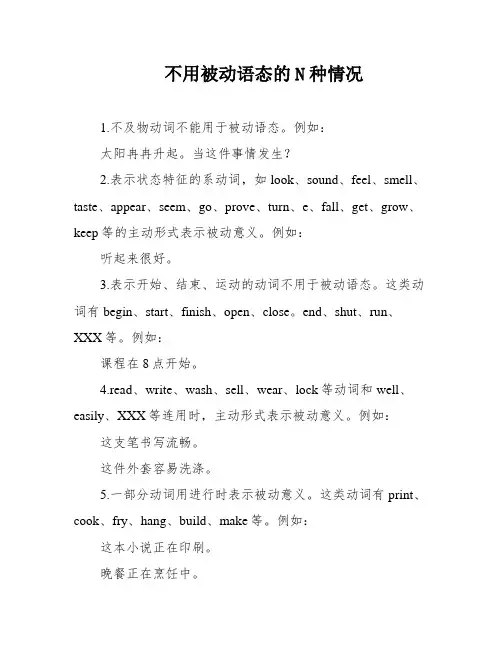
不用被动语态的N种情况1.不及物动词不能用于被动语态。
例如:太阳冉冉升起。
当这件事情发生?2.表示状态特征的系动词,如look、sound、feel、smell、taste、appear、seem、go、prove、turn、e、fall、get、grow、keep等的主动形式表示被动意义。
例如:听起来很好。
3.表示开始、结束、运动的动词不用于被动语态。
这类动词有begin、start、finish、open、close。
end、shut、run、XXX等。
例如:课程在8点开始。
4.read、write、wash、sell、wear、lock等动词和well、easily、XXX等连用时,主动形式表示被动意义。
例如:这支笔书写流畅。
这件外套容易洗涤。
5.一部分动词用进行时表示被动意义。
这类动词有print、cook、fry、hang、build、make等。
例如:这本小说正在印刷。
晚餐正在烹饪中。
6.need、want、require、deserve等动词以物做主语时,后接动名词的主动形式表示被动意义。
我的手表需要修理。
谁说那男孩应该受到惩罚。
7.宾语是反身代词、相互代词、同源宾语时,不用被动语态。
例如:我自学英语。
我们互相帮助。
他们过着幸福的生活。
8.一部分及物动词不用于被动语态。
常见的有:fit、have、wish、cost、leave、enter、reach、suit、benefit(受益)、lack、own等。
例如:他走进房间并拿起了他的书。
我有一本书。
Some phrasal verbs cannot be used in passive voice。
such as breakout。
take place。
lose heart。
come true。
belong to。
consist of。
add up to。
agree with。
arrive at/in。
shake hands with。
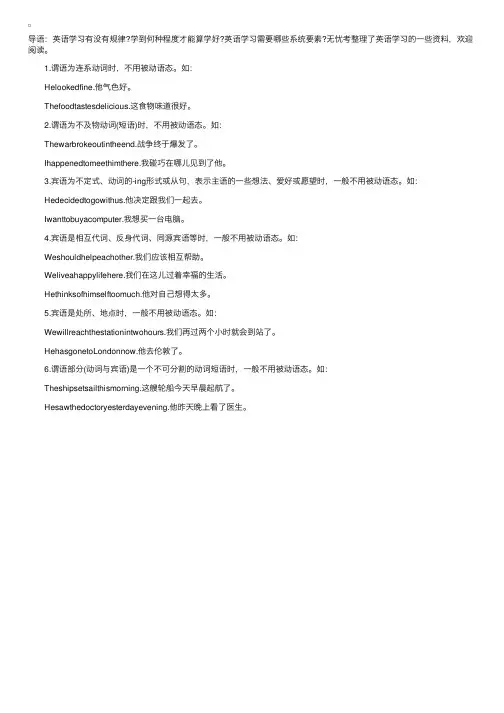
导语:英语学习有没有规律?学到何种程度才能算学好?英语学习需要哪些系统要素?⽆忧考整理了英语学习的⼀些资料,欢迎阅读。
1.谓语为连系动词时,不⽤被动语态。
如: Helookedfine.他⽓⾊好。
Thefoodtastesdelicious.这⾷物味道很好。
2.谓语为不及物动词(短语)时,不⽤被动语态。
如: Thewarbrokeoutintheend.战争终于爆发了。
Ihappenedtomeethimthere.我碰巧在哪⼉见到了他。
3.宾语为不定式、动词的-ing形式或从句,表⽰主语的⼀些想法、爱好或愿望时,⼀般不⽤被动语态。
如: Hedecidedtogowithus.他决定跟我们⼀起去。
Iwanttobuyacomputer.我想买⼀台电脑。
4.宾语是相互代词、反⾝代词、同源宾语等时,⼀般不⽤被动语态。
如: Weshouldhelpeachother.我们应该相互帮助。
Weliveahappylifehere.我们在这⼉过着幸福的⽣活。
Hethinksofhimselftoomuch.他对⾃⼰想得太多。
5.宾语是处所、地点时,⼀般不⽤被动语态。
如: Wewillreachthestationintwohours.我们再过两个⼩时就会到站了。
HehasgonetoLondonnow.他去伦敦了。
6.谓语部分(动词与宾语)是⼀个不可分割的动词短语时,⼀般不⽤被动语态。
如: Theshipsetsailthismorning.这艘轮船今天早晨起航了。
Hesawthedoctoryesterdayevening.他昨天晚上看了医⽣。

高中英语语法不用被动语态的情况2不用被动语态的情况一、不及物动词或动词短语无被动语态:常见的不及物动词:appear, die disappear, end (vi. 结束), fail, happen, last, lie, remain, sit, spread, standbreak out, come true, fall asleep, keep silence, lose heart, take place.比较:rise, fall, happen是不及物动词;raise, seat是及物动词。
(错) The price has been risen. (对). (错) The accident was happened last week.(对)(错) The price has raised.(对)(错) Please seat. (对)(错)After the fire, nothing was remained.(对)要想正确地使用被动语态,就须注意哪些动词是及物的,哪些是不及物的。
特别是一词多义的动词往往有两种用法。
解决这一问题唯有在学习过程中多留意积累。
二、不能用于被动语态的及物动词或动词短语有一些及物动词,尽管他们的后面跟了宾语,但是也不能用于被动语态:fit, have, hold, marry, own, wish, cost, notice, watch agree with, arrive at / in, shake hands with, succeed in, suffer from, happen to, take part in, walk into, belong to例:This key just fits the lock. Your story agrees with what had already been heard.(错)The room was entered by her just now.(对)(错)The queue was jumped by Tom. (对)(错)He isn’t agreed with by me. (对)三、系动词无被动语态:常用的系动词有:1、状态类 2、状态保持不变 3、状态改变4、与感官有关的5、好象6、结果类的例:It sounds good.The building looks very beautiful. Your idea proved to be wrong.四、带同源宾语的及物动词,宾语为反身代词,相互代词或者不定式,不能用于被动语态:die, death, dream, live这几个动词常跟同源宾语。
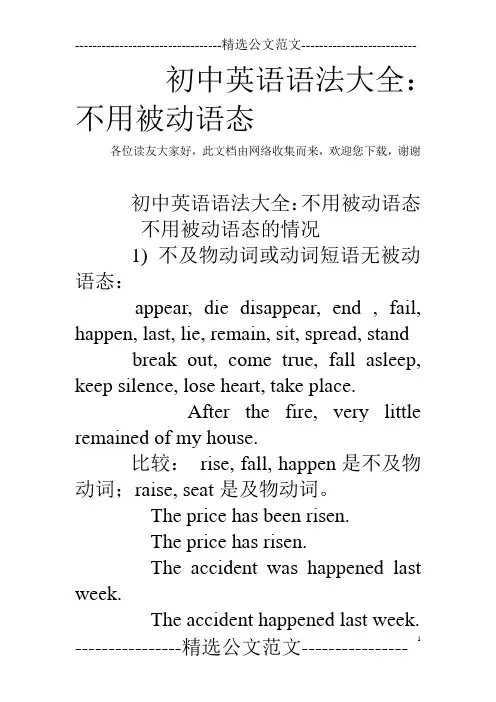
初中英语语法大全:不用被动语态各位读友大家好,此文档由网络收集而来,欢迎您下载,谢谢初中英语语法大全:不用被动语态不用被动语态的情况1) 不及物动词或动词短语无被动语态:appear, die disappear, end , fail, happen, last, lie, remain, sit, spread, stand break out, come true, fall asleep, keep silence, lose heart, take place.After the fire, very little remained of my house.比较:rise, fall, happen是不及物动词;raise, seat是及物动词。
The price has been risen.The price has risen.The accident was happened last week.The accident happened last week.The price has raised.The price has been raised.Please seat.Please be seated.要想正确地使用被动语态,就须注意哪些动词是及物的,哪些是不及物的。
特别是一词多义的动词往往有两种用法。
解决这一问题唯有在学习过程中多留意积累。
2) 不能用于被动语态的及物动词或动词短语:fit, have, hold, marry, own, wish, cost, notice, watch agree with, arrive at / in, shake hands with, succeed in, suffer from, happen to, take part in, walk into, belong toThis key just fits the lock.Your story agrees with what had already been heard.3) 系动词无被动语态:appear, be become, fall, feel, get,grow, keep, look, remain, seem, smell, sound, stay, taste, turnIt sounds good.4) 带同源宾语的及物动词,反身代词,相互代词,不能用于被动语态:die, death, dream, live, lifeShe dreamed a bad dream last night.5) 当宾语是不定式时,很少用于被动语态。
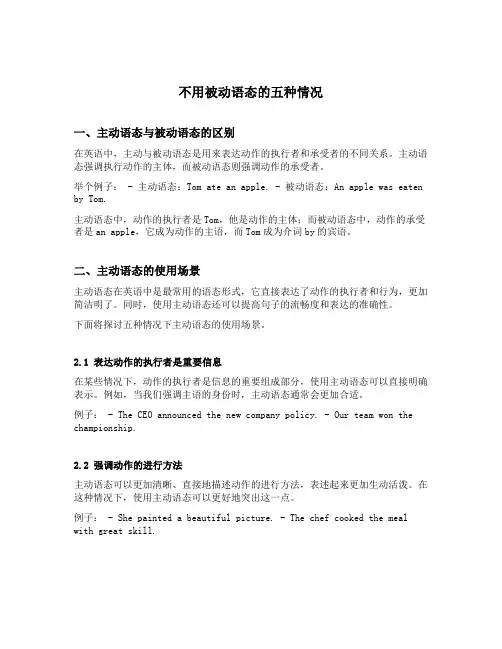
不用被动语态的五种情况一、主动语态与被动语态的区别在英语中,主动与被动语态是用来表达动作的执行者和承受者的不同关系。
主动语态强调执行动作的主体,而被动语态则强调动作的承受者。
举个例子: - 主动语态:Tom ate an apple. - 被动语态:An apple was eaten by Tom.主动语态中,动作的执行者是Tom,他是动作的主体;而被动语态中,动作的承受者是an apple,它成为动作的主语,而Tom成为介词by的宾语。
二、主动语态的使用场景主动语态在英语中是最常用的语态形式,它直接表达了动作的执行者和行为,更加简洁明了。
同时,使用主动语态还可以提高句子的流畅度和表达的准确性。
下面将探讨五种情况下主动语态的使用场景。
2.1 表达动作的执行者是重要信息在某些情况下,动作的执行者是信息的重要组成部分,使用主动语态可以直接明确表示。
例如,当我们强调主语的身份时,主动语态通常会更加合适。
例子: - The CEO announced the new company policy. - Our team won the championship.2.2 强调动作的进行方法主动语态可以更加清晰、直接地描述动作的进行方法,表述起来更加生动活泼。
在这种情况下,使用主动语态可以更好地突出这一点。
例子: - She painted a beautiful picture. - The chef cooked the meal with great skill.2.3 描述习惯性行为或普遍真理当我们需要表达习惯性行为或普遍真理时,主动语态是更为常见的选择。
被动语态在这种情况下显得多余且不必要。
例子: - People need food and water to survive. - Birds build nests to lay eggs.2.4 表述感受、兴趣和态度主动语态可以更好地表达人们的感受、兴趣和态度。
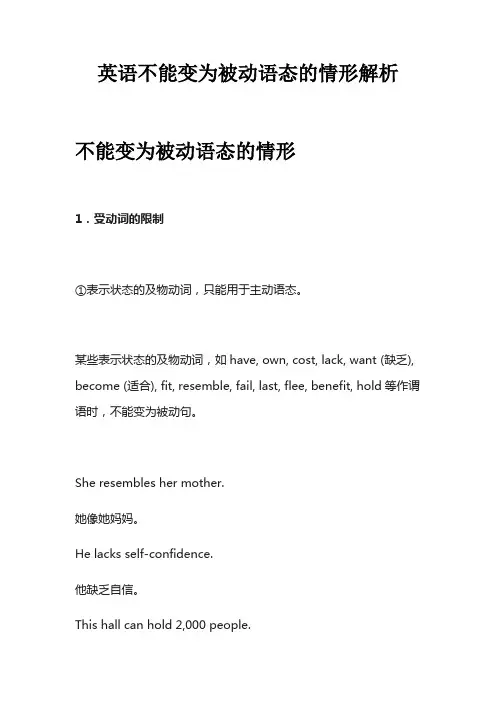
英语不能变为被动语态的情形解析不能变为被动语态的情形1.受动词的限制①表示状态的及物动词,只能用于主动语态。
某些表示状态的及物动词,如have, own, cost, lack, want (缺乏), become (适合), fit, resemble, fail, last, flee, benefit, hold等作谓语时,不能变为被动句。
She resembles her mother.她像她妈妈。
He lacks self-confidence.他缺乏自信。
This hall can hold 2,000 people.这个大厅能容纳两千人。
②当及物动词have表示“吃饭”、“患病”、“明白”、“知道”等意思时,没有被动语态形式。
Would you have a cup of tea ?你要喝杯茶吗?She had a bad cold yesterday, and now she is feeling much better.昨天她得了重感冒,现在好多了。
③当动词get,take表示“懂得”、“知道”,owe表示“欠”,cost表示“使失去(生命、健康等)”的意思时,动词没有相应的被动语态。
Do you get me ?你明白我的意思吗?How do you take this passage这段话你怎么理解?I owe 50 pounds to you.我欠你五十英镑。
His careless driving cost his life.他粗心的驾驶使他丧了命。
2.受宾语的限制①当宾语是相互代词、反身代词或具有类似相互代词的关系时,动词不能用于被动语态形式。
They simply cannot contain themselves for joy.他们简直无法抑制内心的喜悦。
He absented himself from a meeting yesterday.他昨天缺席会议了。
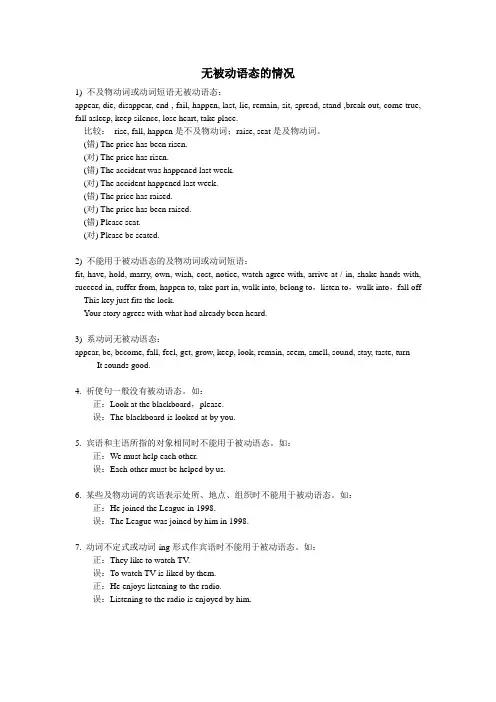
无被动语态的情况1) 不及物动词或动词短语无被动语态:appear, die, disappear, end , fail, happen, last, lie, remain, sit, spread, stand ,break out, come true, fall asleep, keep silence, lose heart, take place.比较:rise, fall, happen是不及物动词;raise, seat是及物动词。
(错) The price has been risen.(对) The price has risen.(错) The accident was happened last week.(对) The accident happened last week.(错) The price has raised.(对) The price has been raised.(错) Please seat.(对) Please be seated.2) 不能用于被动语态的及物动词或动词短语:fit, have, hold, marry, own, wish, cost, notice, watch agree with, arrive at / in, shake hands with, succeed in, suffer from, happen to, take part in, walk into, belong to,listen to,walk into,fall off This key just fits the lock.Your story agrees with what had already been heard.3) 系动词无被动语态:appear, be, become, fall, feel, get, grow, keep, look, remain, seem, smell, sound, stay, taste, turn It sounds good.4. 祈使句一般没有被动语态。
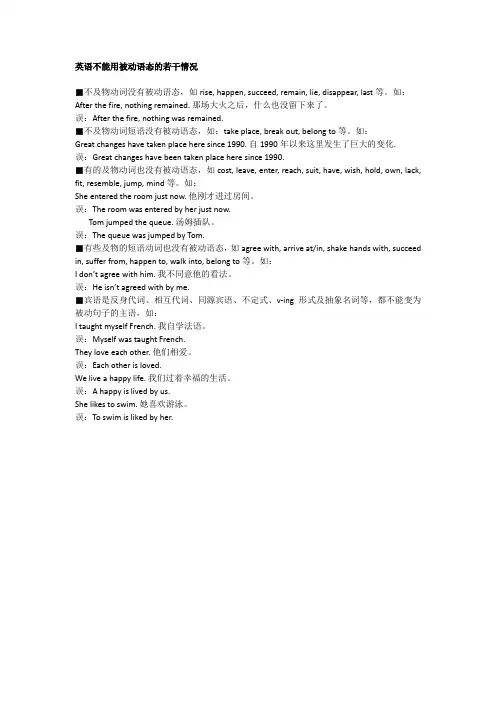
英语不能用被动语态的若干情况■不及物动词没有被动语态,如rise, happen, succeed, remain, lie, disappear, last等。
如:After the fire, nothing remained. 那场大火之后,什么也没留下来了。
误:After the fire, nothing was remained.■不及物动词短语没有被动语态,如:take place, break out, belong to等。
如:Great changes have taken place here since 1990. 自1990年以来这里发生了巨大的变化.误:Great changes have been taken place here since 1990.■有的及物动词也没有被动语态,如cost, leave, enter, reach, suit, have, wish, hold, own, lack, fit, resemble, jump, mind等。
如:She entered the room just now. 他刚才进过房间。
误:The room was entered by her just now.Tom jumped the queue. 汤姆插队。
误:The queue was jumped by Tom.■有些及物的短语动词也没有被动语态,如agree with, arrive at/in, shake hands with, succeed in, suffer from, happen to, walk into, belong to等。
如:I don’t agree with him.我不同意他的看法。
误:He isn’t agreed with by me.■宾语是反身代词、相互代词、同源宾语、不定式、v-ing形式及抽象名词等,都不能变为被动句子的主语,如:I taught myself French. 我自学法语。
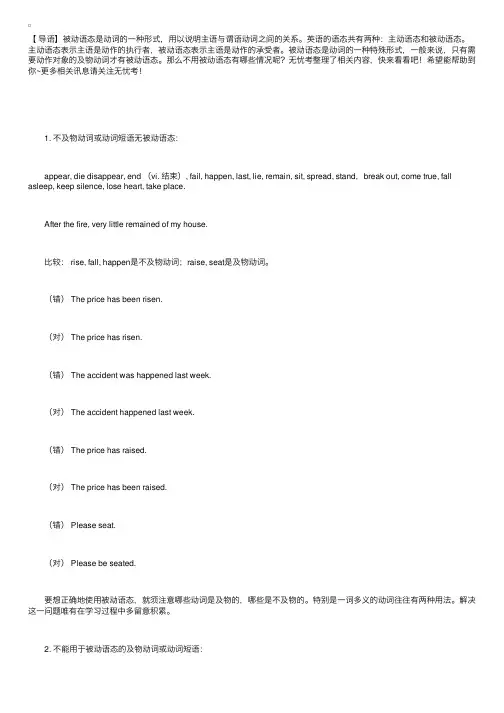
【导语】被动语态是动词的⼀种形式,⽤以说明主语与谓语动词之间的关系。
英语的语态共有两种:主动语态和被动语态。
主动语态表⽰主语是动作的执⾏者,被动语态表⽰主语是动作的承受者。
被动语态是动词的⼀种特殊形式,⼀般来说,只有需要动作对象的及物动词才有被动语态。
那么不⽤被动语态有哪些情况呢?⽆忧考整理了相关内容,快来看看吧!希望能帮助到你~更多相关讯息请关注⽆忧考! 1. 不及物动词或动词短语⽆被动语态: appear, die disappear, end (vi. 结束), fail, happen, last, lie, remain, sit, spread, stand,break out, come true, fall asleep, keep silence, lose heart, take place. After the fire, very little remained of my house. ⽐较: rise, fall, happen是不及物动词;raise, seat是及物动词。
(错) The price has been risen. (对) The price has risen. (错) The accident was happened last week. (对) The accident happened last week. (错) The price has raised. (对) The price has been raised. (错) Please seat. (对) Please be seated. 要想正确地使⽤被动语态,就须注意哪些动词是及物的,哪些是不及物的。
特别是⼀词多义的动词往往有两种⽤法。
解决这⼀问题唯有在学习过程中多留意积累。
2. 不能⽤于被动语态的及物动词或动词短语: fit, have, hold, marry, own, wish, cost, notice, watch agree with, arrive at / in, shake hands with, succeed in, suffer from, happen to, take part in, walk into, belong to This key just fits the lock. Your story agrees with what had already been heard. 3. 系动词⽆被动语态: appear, be become, fall, feel, get, grow, keep, look, remain, seem, smell, sound, stay, taste, turn It sounds good. 4.带同源宾语的及物动词,反⾝代词,相互代词,不能⽤于被动语态: die, death, dream, live, life She dreamed a bad dream last night. 5. 当宾语是不定式时,很少⽤于被动语态。
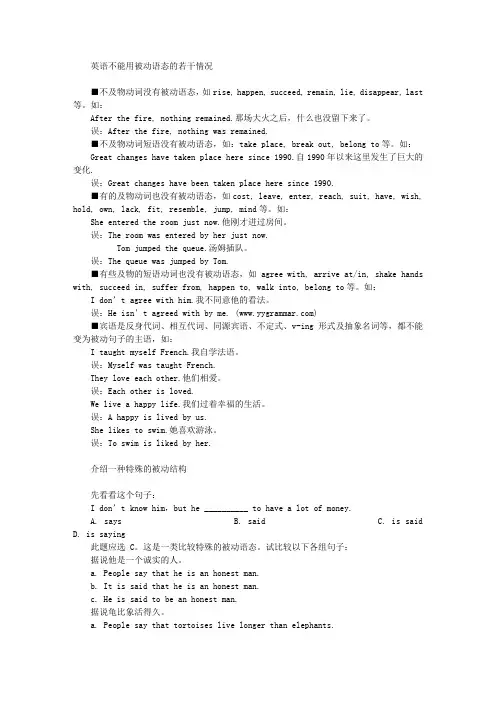
英语不能用被动语态的若干情况■不及物动词没有被动语态,如rise, happen, succeed, remain, lie, disappear, last等。
如:After the fire, nothing remained.那场大火之后,什么也没留下来了。
误:After the fire, nothing was remained.■不及物动词短语没有被动语态,如:take place, break out, belong to等。
如:Great changes have taken place here since 1990.自1990年以来这里发生了巨大的变化.误:Great changes have been taken place here since 1990.■有的及物动词也没有被动语态,如cost, leave, enter, reach, suit, have, wish,hold, own, lack, fit, resemble, jump, mind等。
如:She entered the room just now.他刚才进过房间。
误:The room was entered by her just now.Tom jumped the queue.汤姆插队。
误:The queue was jumped by Tom.■有些及物的短语动词也没有被动语态,如agree with, arrive at/in, shake handswith, succeed in, suffer from, happen to, walk into, belong to等。
如:I don’t agree with him.我不同意他的看法。
误:He isn’t agreed with by me. ()■宾语是反身代词、相互代词、同源宾语、不定式、v-ing形式及抽象名词等,都不能变为被动句子的主语,如:I taught myself French.我自学法语。
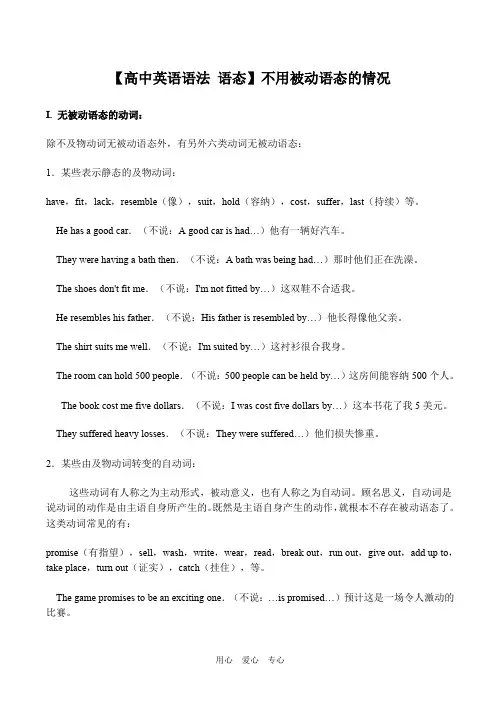
【高中英语语法语态】不用被动语态的情况I. 无被动语态的动词:除不及物动词无被动语态外,有另外六类动词无被动语态:1.某些表示静态的及物动词:have,fit,lack,resemble(像),suit,hold(容纳),cost,suffer,last(持续)等。
He has a good car.(不说:A good car is had…)他有一辆好汽车。
They were having a bath then.(不说:A bath was being had…)那时他们正在洗澡。
The shoes don't fit me.(不说:I'm not fitted by…)这双鞋不合适我。
He resembles his father.(不说:His father is resembled by…)他长得像他父亲。
The shirt suits me well.(不说:I'm suited by…)这衬衫很合我身。
The room can hold 500 people.(不说:500 people can be held by…)这房间能容纳500个人。
The book cost me five dollars.(不说:I was cost five dollars by…)这本书花了我5美元。
They suffered heavy losses.(不说:They were suffered…)他们损失惨重。
2.某些由及物动词转变的自动词:这些动词有人称之为主动形式,被动意义,也有人称之为自动词。
顾名思义,自动词是说动词的动作是由主语自身所产生的。
既然是主语自身产生的动作,就根本不存在被动语态了。
这类动词常见的有:promise(有指望),sell,wash,write,wear,read,break out,run out,give out,add up to,take place,turn out(证实),catch(挂住),等。
无被动语态的情况1) 不及物动词或动词短语无被动语态:appear, die, disappear, end , fail, happen, last, lie, remain, sit, spread, stand ,break out, come true, fall asleep, keep silence, lose heart, take place.比较:rise, fall, happen是不及物动词;raise, seat是及物动词。
(错) The price has been risen.(对) The price has risen.(错) The accident was happened last week.(对) The accident happened last week.(错) The price has raised.(对) The price has been raised.(错) Please seat.(对) Please be seated.2) 不能用于被动语态的及物动词或动词短语:fit, have, hold, marry, own, wish, cost, notice, watch agree with, arrive at / in, shake hands with, succeed in, suffer from, happen to, take part in, walk into, belong to,listen to,walk into,fall off This key just fits the lock.Your story agrees with what had already been heard.3) 系动词无被动语态:appear, be, become, fall, feel, get, grow, keep, look, remain, seem, smell, sound, stay, taste, turn It sounds good.4. 祈使句一般没有被动语态。
不能用于被动语态的几种情况总结四川省阆中中学校任金石1、there be 结构及所有的不及物动词或动词短语充当谓语时,无被动语态。
e.g:There are twelve moths in a year,Many of his songs have remained popular as ever,他的许多歌曲和以往一样仍然很流行。
Winning the medal is like a dream come true.获得奖牌好比梦想成真。
注:常见的不及物动词或动词短语有:appear, die, happen, lie(躺;位于), remain, occur, come true, break out, take place 等。
2、表示“状态”的谓语动词,如:last, hold, benefit, contain, equal, fit, join, mean, look like, consist of 等不能用被动语态。
e.g:Each game lasts about an hour.每场比赛约一小时。
The committee consists of ten members.委员会由十人组成。
3、表示“归属”的动词,如have,own,belong to 等。
e.g:We have three meals a day.我们一日吃三餐。
These islands belong to Spain.这些岛屿隶属西班牙。
4、表示“希望、意图”的动词,如wish,want,hope,like,love,hate等。
e.g:But I hate autumn and winter。
但是我讨厌秋天和冬天。
5、宾语是反身代词或相互代词时谓语动词用主语语态,不能用被动语态。
e.g:We should help each other.I foundmyself unable to speak.我发现自己说不出话了。
无被动语态的动词除不与物动词无被动语态外,有另外六类动词无被动语态:1.某些表示静态的与物动词:have, suit,hold〔容纳〕,cost,suffer,last〔持续〕等。
He has a good car.〔不说:A good car is had…〕他有一辆好汽车。
They were having a bath then.〔不说:A bath was being had…〕那时他们正在洗澡。
The shoes don't fit me.〔不说:I'm not fitted by…〕这双鞋不适宜我。
He resembles his father.〔不说:His father is resembled by…〕他长得像他父亲。
The shirt suits me well.〔不说:I'm suited by…〕这衬衫很合我身。
The room can hold 500 people.〔不说:500 people can be held by…〕这房间能容纳500个人。
The book cost me five dollars.〔不说:I was cost five dollars by…〕这本书花了我5美元。
They suffered heavy losses.〔不说:They were suffered…〕他们损失沉重。
2.某些由与物动词转变的自动词(不需借助宾语即可表达动作,区别他动词,需要借助宾语表达动作)这类动词常见的有:promise〔有指望〕,sell,wash,write,wear,read,break out,run out,give out,add up to,take place,turn out〔证实〕,catch 〔挂住〕,等。
The goods sell well.〔不说:…are sold…〕这些商品畅销。
The clothes wash well.〔不说:…are washed…〕这些衣服好洗。
无被动语态的动词口诀
口诀是“将来进行无被动,现在完成进行同”。
这两种时态都没有被动形式。
另外,不及物动词带有同原宾语的动词,反身代词的动词和系动词都无被动形式。
无被动语态的动词及短语
1)不及物动词或动词短语无被动语态(即多数的瞬间动词):
appear,die,disappear,end,fail,happen,last,lie,remain,sit,sprea d,stand break out,come true,fall asleep,keep silence,lose heart,take place.
2)不能用于被动语态的及物动词或动词短语:
fit,have,hold,marry,own,wish,cost,notice,watch agree with,arrive at/in,shake hands with,succeed in,suffer from,happen to,take part in,walk into,belong to.
3)系动词无被动语态:
appear,be
become,fall,feel,get,grow,keep,look,remain,seem,smell,sound,sta y,taste,turn等;
It sounds good.
4)带同源宾语的及物动词,反身代词,相互代词,不能用于被动语态:
die,death,dream,live,life
She dreamed a bad dream last night.
5) 当宾语是不定式时,很少用于被动语态。
(对) She likes to swim.
(错) T o swim is liked by her.。
小学英语学习中的无被动语态【编者按】小升初为大家收集整理了小学英语学习中的无被动语态供大家参考,希望对大家有所帮助!小学英语学习中,有很多语法知识是我们必须要掌握的。
抓住这些关键语法,我们的小学英语学习效果才能更突出。
所以,在小学英语学习中,我们对下面这些内容有必要来进行了解。
被动语态是比较常见的。
小学英语学习中,这些内容也很重要,然而无被动语态的一些语法更是需要我们去了解。
1)不及物动词或动词短语无被动语态:appear,diedisappear,end(vi.结束),fail,happen,last,lie,remain,sit,spread,standbreakout,cometrue,fallasleep,keepsilence,loseheart,takeplace.Afterthefire,verylittleremainedofmyhouse.比较:rise,fall,happen是不及物动词;raise,seat是及物动词。
(错)Thepricehasbeenrisen.(对)Thepricehasrisen.(错)Theaccidentwashappenedlastweek.(对)Theaccidenthappenedlastweek.(错)Thepricehasraised.(对)Thepricehasbeenraised.(错)Pleaseseat.(对)Pleasebeseated.要想正确地使用被动语态,就须注意哪些动词是及物的,哪些是不及物的。
特别是一词多义的动词往往有两种用法。
解决这一问题唯有在学习过程中多留意积累。
2)不能用于被动语态的及物动词或动词短语:fit,have,hold,marry,own,wish,cost,notice,watchagreewith,arriveat/i n,shakehandswith,succeedin,sufferfrom,happento,takepartin,walkinto,b elongtoThiskeyjustfitsthelock.Yourstoryagreeswithwhathadalreadybeenheard.3)系动词无被动语态:appear,bebecome,fall,feel,get,grow,keep,look,remain,seem,smell,so und,stay,taste,turnItsoundsgood.4)带同源宾语的及物动词,反身代词,相互代词,不能用于被动语态:die,death,dream,live,lifeShedreamedabaddreamlastnight.5)当宾语是不定式时,很少用于被动语态。
1.不及物动词没有被动语态
因为不及物动词没有宾语,所以若将其用于被动语态则没有主语,故不能用于被动语态。
但是值得注意的是,有些英语中的不及物动词,翻译成汉语时却可能是“及物”的,很容易出错,这类动词如:take place(发生),happen(发生),come about(发生),braeak out (爆发),appear(出现),disappear(消失),last(持续),arise(出现、发生)等:
A fire broke out during the night.夜间发生了火灾。
Influenza usually breaks out in winter. 流感通常发生在冬季。
Use this money when the need arises. 有需要时就使用这笔钱。
2.某些静止动词不用于被动语态
英语有些静态动词(如have, lack, fit, hold, suit, resemble等)通常不用于被动语态,如以下各句均不能用被动语态:
My shoes don’t fit me. 我的鞋不合适。
The young man lacks experience. 这个年轻人缺乏经验。
The hall holds 1000 people. 大厅可容纳1000人。
3.宾语为相互代词和反身代词通常不能用作主语,所以当它们用作
动词宾语时,句子不能转换成被动语态。
We should help each other. 我们应该相互帮助。
He could see himself in the mirror. 他在镜子中可以看到自己。